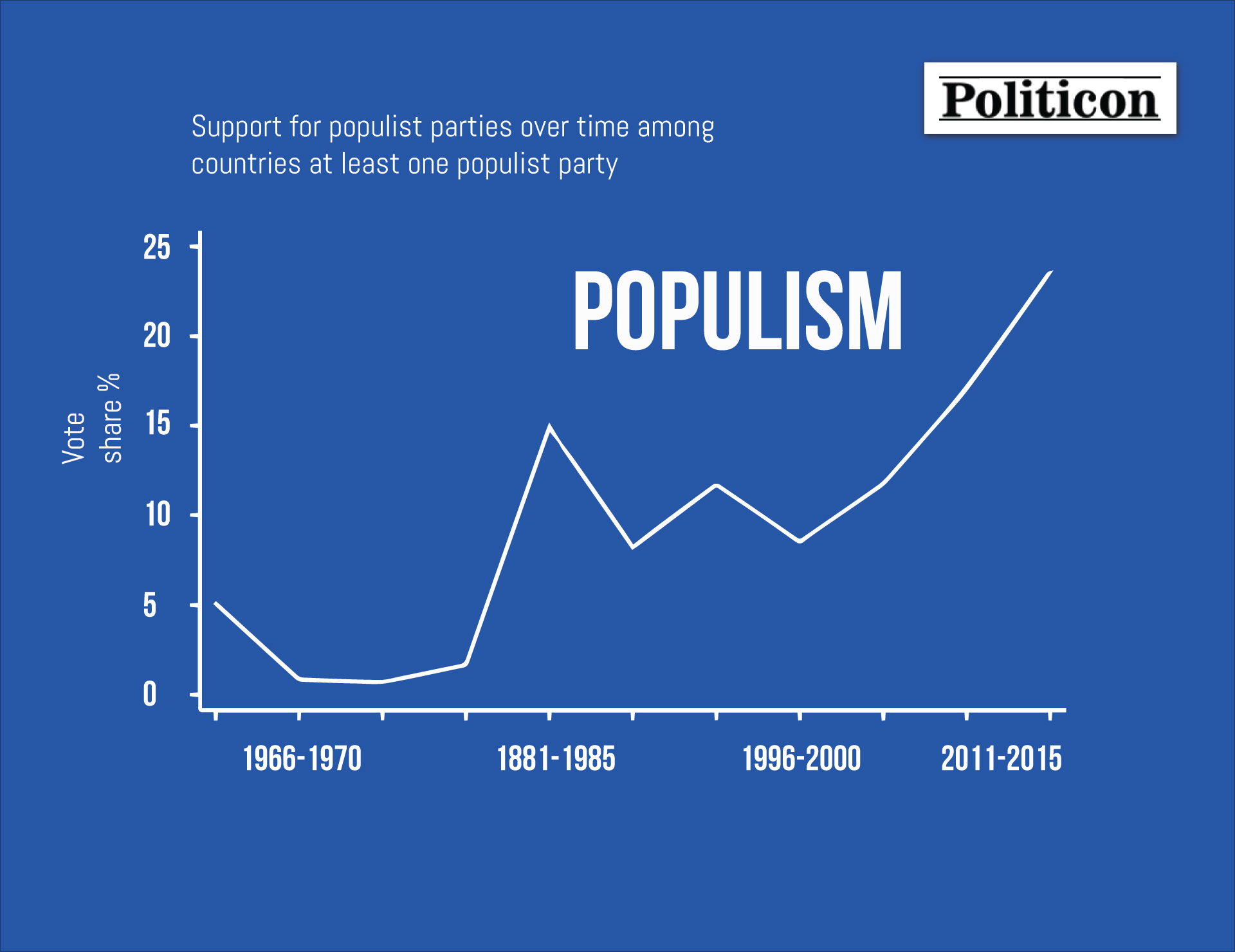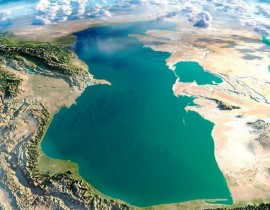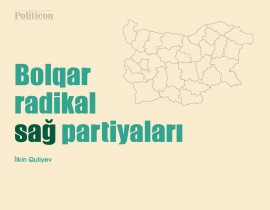Politicon.co
“Aggressive Expansion” – Populism and its Economic Roots

Introduction
In 2004, yet to become President Barack Obama in his keynote address at the Democratic National Convention Tuesday stated that “When we send our young men and women into harm’s way, we have a solemn obligation… to earn the respect of the world”. The center of his speech in 2004 constitutes a sharp contrast with President Trump’s populist speeches, which contain xenophobic and racist elements. The rise of both right and left-wing populism is not just constrained with the geography of the United States but can be observed in Latin America, Europe, and Asia as well. Given the characteristics of the populist ideology, the rise of populism is worrying. Dutch political scientist Cas Mudde examines Right-Wing Populism (RWP) and its association with nativist and authoritarian attitudes along with the populist one (Mudde & Kaltwasser, 2017).1 Rosenberg claims that “RWP challenges the basic tenets of liberal democracy”. Populist leaders are likely to “engage in occupying the state, mass clientelism and corruption, and the suppression of anything like a critical civil society” (Müller, 2017).2 To grasp the recent “populist explosion” and avoid the harms of it, one needs to investigate the underlying causes. On the one hand, Rosenberg claims that since the elites lost the authority, and ordinary people are more involved in politics, people picked authoritarian populist leaders who have simple premises (29). On the other hand, it is argued that the economic consequences of globalization led to the rise in votes for far-right parties (Colantone & Stanig, 2019).3 The uneven distribution of benefits of globalization, which stepped into deeper global integration after the late 1980s, is seen as a crucial factor behind the rise of populism (Rodrik, 2017).4 Given the empirical evidence, the unfair distribution of benefits of globalization and speeded up technological change, which reduces the demand for low-skilled workers, seems to have an impact on the expansion populist movement that is promising protectionist measures as a solution to the problem (Rodrik, 2017).
Aggressive Expansion
To understand the underlying reasons behind the aggressive expansion of populist ideology in the world of politics, we need to ask what populism is, look through the logic of populism and have a retrospective on the roots of populism. There is a scholarly debate on the attributes of populism, which define it as an ideology. To conceptualize populism, we may first start with some of the associations made with populism and try to show why these associations are incompetent.
Müeller argues that populism is mostly associated with the concept of irresponsible policies (mostly economic) (Müller, 2017). Further, there is a common belief that supporters of populism are restricted to a particular socioeconomic group in society. One may observe both associations while exploring the characteristics of populism movements to some extent. For instance, Turkish political leader Recep Tayyip Erdogan whose political stand is closely tied to populism tried to fight with inflation by inspecting the stores one by one and forcing them not to increase or to decrease the prices. However, the irresponsibility of these so-called economic policies is prevalent since his party’s demand boosting economic policies to gain votes in the elections led to the overheating economy and resulted in the inflation.
However, one should admit that defining populism on the grounds of irresponsible policies of populist leaders is incompetent since this characteristic can be attributed to many other ideologies. One may detect that rise of neoliberal policies towards the end of the 20th century and following the expansion of free trade and the rise of transnational corporations led to the huge inequality and even hindered the growth of some developing countries despite the initial expectations was in contrast. Nonetheless, while trying to elaborate on the concept of neoliberalism we do not define it with the irresponsibility of neoliberal policies towards those groups who were left behind in globalization.
Further, one may also detect that supporters of populist movements follow some pattern concerning the socio-economic classes in society. Judis indicates that populist parties in Europe expanded their political base towards the end of the 20th century to the working class and associated their populist parties with the working class (2017).5 However, we can still show that defining populism on its association with socio-economic class does not contribute to forming a complete understanding of the ideology. Some populist strategies of political parties follow a path where they gain the support of people through emphasizing people’s religious or nationalist identities as a part of their political commitments. Since these identities do not correspond with a particular socio-economic class, populist strategies also do not base their framework on the demands of the specific socio-economic class.
Hence, we go back to our initial question: What is populism? Mudde and Kaltwasser claim that populism is, first, a thin-centered ideology. What they mean by thin-centered is that populism is attached to, sometimes is even assimilated into, other ideologies. Hence, populist ideology is not capable of generating complex and original answers to questions that modern societies ask (Mudde and Kaltwasser, 2017). Further, populism separates societies into two homogenous and conflicting groups, which can be described as pure people versus corrupt elites. Based on this distinction, populism argues that power in society should belong to pure people.6
This definition is in line with Müller’s explanation for the logic of populism. Müller argues that populism is a moralistic imagination of politics in which ultimately fictional concept of fully unified pure people are against to the morally inferior elites (2017). It should be noted that according to Müller being against elites is a necessary but not sufficient condition since everyone against elites would be considered as politics otherwise. By underlying this antagonizing distinction of people from the concept of populism he deducts that populism is antipluralist. Those groups who does not support populism are not considered as proper people, hence, are not considered as legitimate competitors.
The concept of populism is associated with the American identity. In 1891, few members of Kansas Farmers Alliance used a populist term to describe their political views. A year after, they formed a short-lived People’s Party and did remarkably well in the 1892 and 1894 elections. One could detect populist claims in People’s Party’s manifesto. Populist congressman Ignatius Donnelly’s preamble which became manifesto for People’s Party underlines the importance of the government’s restoration to the “pure people’s” hands. He claimed that the poverty and injustice in the society is related with the government’s lack of efforts to stop them. Adaptation of the populist party’s key planks by the Democrats damaged People’s Party and they collapsed in 1908. This adaptation was not only specific to the People’s Party. Populist demands such as nationalization of industries, increase in regulations, and reduction in inequality had a substantial impact on policies of both Democrats and Republicans. To constrain the expansion of populist movement, Roosevelt also adapted some populist agenda which eventually led to the reduction of the political pressure coming from populist Huey Long.
The similar scenario also happened in 60’s when George Wallace was politically active and a popular for his populist and segregationist views. His views imitated anti-elitist stand and supported actions to increase the welfare of middle-class white Americans which was a representative of “pure people” from the populist perspective. Although his political stand contained racist and xenophobic elements as People’s Party, the core of the segregationist view lied in economic reasons. Judis emphasized that Wallace’s opposition to the racial integration and welfare distribution to the racially discriminated people was framed with the view against the tyranny of bureaucrats (27). Rather than compensating those people who situated in both tales of income distribution he claimed that government policies should benefit average middle income white American citizens. His movement failed under the populist identity, however, transformed the politics of his currents. Republican party adopted his view on state and government rights (Judis, 2017).
To sum up, the historical perspective on the evolution of populist politics in United States suggests us through the movement contained racially discriminative tone, it mainly based the political agenda on the injustice done to the specific group of people in the society. The racially discriminative tone of populists emerged because of the benefit loss of the specific group – pure people – due to the welfare distribution going to poor racial minority groups. Henceforth, when we analyze the underlying roots of current populist expansion identifying economic causes can be relevant.
Today’s Populist Explosion and Its Economic Roots
The anti-establishment voice of populist parties splits people with non-people, which encompasses elites, immigrants, in general, all people who do not share the view of populist movements. With their stand against globalization and tendency toward authoritarianism, populism is more widespread than ever around western democracies. The clash of markets in 2008 and the influx of immigrants from North Africa and the Middle East to Europe led to the populist explosion all over Europe. After the Great Recession, international finance disappeared from countries like Greece and Spain, and they were left with a heavy debt burden. To get more loans, European Troika required very heavy austerity measures such as tax rises and cuts in public spending which led to the spark of the populist uprising against the heavy burden of establishments and the subservient response of both right and left-wing parties to these austerity measures. The election (in 2012 and 2015) success of SYRIZA, which transformed its political stand from Eurocommunist left to the populism, in Greece was heavily maintained by the votes of the young people, the unemployed, and the urban employed people both in the public and private sector (Judis, 2017). The rise of Podemos in Spain was also a populist backlash towards the austerity measures put on Spain after the 2008 crisis. Podemos was a populist party and promised the end of austerity measures. They used their leader as a unifying symbol of their party, which is a populist strategy. Although Podemos was able to expand its popularity, they could not capture political power in Spain, and SYRIZA did in Greece. Further, SYRIZA is also regarded as a failure of populist promise since they eventually negotiated with the Troika and applied their austerity measures.
The populist movement in North and Western Europe is more associated with its right-wing claims. Populist Parties in France and Denmark were supporters of the welfare state, and they wanted the beneficiaries of the welfare programs to be the Danish and French people rather than immigrants. The tone of these populist parties contains xenophobic elements, and anti-immigrant policies are highlighted in their agenda. In Denmark, the Liberal party used the populist People’s Party’s agenda on immigration, Islam, and refuges through reducing benefits to immigrants and refugees by 45% and similar measures. The situation is like the one in the United States where the antiestablishment claims of populist leaders (such as Wallace and Long) transformed the politics of their currents.
The most successful populist party concerning their impact on politics was UKIP in the EU. UKIP’s voter base can be a good starting point while analyzing the economic roots of the spread of populism. Supporters of UKIP are mainly clustered in mining and manufacturing regions of the UK which are industrial ghost-towns. Those supporters of UKIP are characterized as blue-collar workers who were left behind in the economic development of the UK. The association between populist fronts and the working-class is emerged and strengthened because of the unfair competition brought by neoliberal globalization.
.png)
Source: Statista
In this sense, investigating the concept of “unfair competition”, which emerged because of economic globalization, is important. Rodrik argues that job-displacement and income losses of some groups due to the unfair reallocation of the benefits of international trade causes the populist uprising (2018). Removal of trade regulation – restrictions of capital mobility and implementation of deeper economic integration (on an international base) policy created a situation in which political and distributive costs of the global economic integration exceeds the net economic benefits (Rodrik, 2018). Rising inequality (as it is shown in the graph, Gini index, which measures income inequality, is on the rise for the US after 1990), decreasing wages, deindustrialization in developed countries, and competition from developing countries for the blue-collar workers, in general, those ones who were left behind in the global integration gives an opportunity for the radical left and right parties to offer protection for the left-behinds by using populist political agenda (Milner, 2019).7 These populist movements and leaders to solve the redistributive costs of globalization for some groups, offer more regulations on international trade and try to bring back the industries to their countries.
Concluding Remarks
It is observable that populism has been on the rise in Europe and America through the recent decade. Considering the influence of populist movements in the antagonizing split of society and the rise of authoritarianism underlying toots of the populist explosion need to be investigated. Populist parties and leaders expanded their voter platform by addressing the rising inequality, loss of jobs, and dropping wages (of the people left behind) due to the competition faced by developing countries. As a solution to these issues, populist leaders opposed globalization. The inability of the left and right parties in addressing these issues allowed populist movements to spread. Both right- and left-wing populists put forward their antiestablishment and antiliberal stands to overcome the economic hardships and unfair competition faced by the people, who are the only ones supporting their movement. Therefore, investigating the economic roots of the recent populist explosion and presenting sound and adequately complex economic policies to the sophisticated economic problems is crucial to contain the antagonizing grip of populism.
References
[1] Mudde, C., & Kaltwasser, C. R. (2017). Populism: A very short introduction. New York: Oxford University Press.
[2] Müller, J. (2017). What Is Populism? S.l.: Penguin Books.
[3] Colantone, I., & Stanig, P. (2019). The Surge of Economic Nationalism in Western Europe. Journal of Economic Perspectives, 33(4), 128-151. doi:10.1257/jep.33.4.128
[4] Rodrik, D. (2017). Populism and the Economics of Globalization. doi:10.3386/w23559
[5] Judis, J. B. (2017). The populist explosion: How the great recession transformed American and European politics. Columbia Global Reports.
[6] Definition is taken from Mudde and Kaltwasser
[7] Milner, H. V. (2019). Globalisation, Populism and the Decline of the Welfare State. Survival, 61(2), 91-96. doi:10.1080/00396338.2019.1589087
![]()
- TAGS :
- Populism
- TOPICS :
- Society








jpg-1599133320.jpg)

